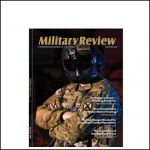
e-Document
|
Military Review, July-August 2009.
Copies
0 Total copies, 0 Copies are in,
0 Copies are out.
Exploiting insurgent violence in Afghanistan. Lieutenant Colonel Thomas Brouns, U.S. Army; We need to energize and empower ordinary Afghans to help extinguish the fire in Afghanistan.
Adult education in Afghanistan: the key to political and economic transformation. Captain Chad M. Pillai, U.S. Army; Provincial reconstruction teams and tactical military units can devise affordable programs that can significantly reduce the illiteracy rate in Afghanistan.
Rethinking IED strategies: from Iraq to Afghanistan. Commander John Moulton, U.S. Navy; If they view IEDs as murder weapons left at the scene of a crime rather than landmines placed to inhibit maneuver, coalition forces will reap intelligence on IED networks through forensic analysis.
Afghanistan's Nangarhar Inc: a model for interagency success. Major David K. Spencer, U.S. Army; To be successful in the War on Terrorism, we must duplicate the level of U.S. interagency cooperation that created the Nangarhar Inc brand in Afghanistan.
The Israeli Defense Forces response to the 2006 war with Hezbollah. Matt M. Matthews; The Israeli Defense Force has proved adept at indentifying and analyzing its mistakes and miscalculations. One need look no further than the 2008 Gaza conflict to affirm its success in this endeavor.
Detainee healthcare as part of information operations. Lieutenant Colonel Beverly D. Patton, U.S. Army; The dissemination of positive messages about the medical care of detainees in Iraq can further U.S. political goals.
Understanding Innovation. Colonel Thomas M. Williams, U.S. Army Reserve ; In contemporary usage, the word "innovation" is now just a common buzzword used to sell everything from software to blenders. Understanding what it means for a bureaucratic institution like the Army will help achieve it.
Future strategic environment in an era of persistent conflict. Major Paul S. Oh, U.S. Army; The challenges of the next 20 years are immense and diverse. The U.S. military must be flexible and multi-talented.
How to end the genocide in Darfur and why it won't happen. Midshipman Brendon J. Mills, U.S. Naval Academy; The Pentagon is unlikely to spend precious time and resources on genocide prevention in Darfur because the violence there does not pose a threat to U.S. national security.
Misguided intentions: resisting AFRICOM. Captain Moussa Diop Mboup, Sengalese Army; Michael Mihalka, Ph.D.; and Major Douglas Lathrop, U.S. Army, Retired; AFRICOM should renounce its usual bilateral strategy and focus on collaboration with African institutions lest they see our rhetoric of "democracy" as a modern-day version of the "white man's burden."
Leveraging liminality in post-conflict security sector reform. Major Louis P. Melancon, U.S. Army; If the decision to leverage liminality is appropriate in security sector reform, caution should also be part of the plan.
Insights.
The role of empathy in irregular warfare. Major John Bauer, U.S. Army; A single rule serves as a useful guideline for building legitimacy, "Treat the population as you would want yourself to be treated."
The School of Advanced Military Studies: an accident of history. Brigadier General Huba Wass de Czege, U.S. Army, Retired; In this, the 25th year since its inception, SAMS needs to recalibrate its focus on operational art.
Terrorists: neither soldiers nor criminals. Amitai Etzioni; Conventional armies that adhere to the rules of war when confronting terrorists are disadvantaged and under pressure to circumvent the rules. Conditions suggest work is needed to modify and update the law of land warfare.
Field hospital support for civilians in counterinsurgency operations. Colonel Albert R. Bryan, U.S. Army Reserve, Retired; Medical support of civilians in an area of operations can be a tool for counterinsurgency. It is time to change the doctrine.
Review essay.
Influencing a soldier, lessons learned. Steve McGregor
Book reviews: contemporary readings for the military professional.
Commander's initial guidance.
Eight imperatives for success in Afghanistan. General Stanley A. McChrystal, U.S. Army
Title
Military Review, July-August 2009.
Call No
CDMC Military Review
Digital Link
Subjects
Lessons learned Afghanistan Operation Enduring Freedom (OEF) Afghan National Security Forces (ANSF) Adult education Improvised Explosive Devices (IED) Interagency cooperation Israeli Defense Forces Information operations Darfur AFRICOM US African Command Security operations School of Advanced Military Studies (SAMS)
Language
English
Published
Fort Leavenworth, KS : Combined Arms Center,, 2009;.
Series
Target Audience
Unknown or not specified








